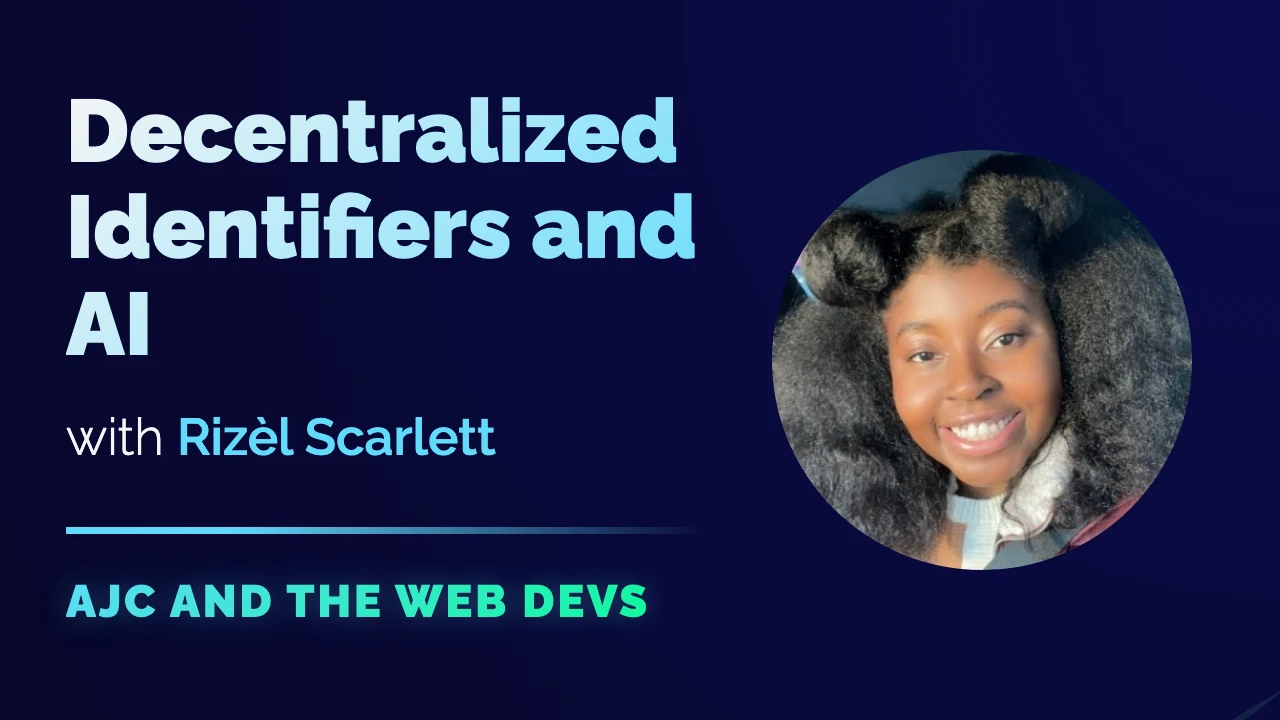
Decentralized Identifiers and AI with Rizèl Scarlett
Published:
Rizèl Scarlett discusses decentralized identifiers, Web5, and AI applications, exploring data ownership and identity verification in the digital age.
Episode Summary
In this episode, Rizèl Scarlett from TBD (a company within Block) discusses decentralized identifiers (DIDs), Web5, and AI applications with Anthony Campolo. They explore the concept of data ownership, identity verification, and the potential of decentralized web technologies. Rizèl explains TBD’s approach to decentralized identifiers and how they differ from blockchain-based solutions. They discuss various use cases for DIDs and verifiable credentials, including financial transactions, content verification, and personal AI assistants. The conversation also touches on the challenges of promoting these technologies and their potential impact on data privacy and user control. Throughout the discussion, they compare Web5 concepts to Web3 and blockchain technologies, highlighting similarities and differences.
Chapters
00:00 - Introduction and Overview
This chapter introduces Rizèl Scarlett and her current role at TBD, a company within Block. Rizèl explains her transition from GitHub to TBD and briefly outlines the company’s focus on data ownership, identity verification, and financial solutions. The conversation sets the stage for a deeper discussion on decentralized technologies and their applications in various fields.
02:56 - Deep Dive into Decentralized Identifiers (DIDs) and Web5
In this segment, Rizèl and Anthony delve into the concept of decentralized identifiers (DIDs) and how they function within the Web5 ecosystem. They discuss the differences between Web5 and Web3 approaches, particularly focusing on TBD’s implementation of DIDs without relying on blockchain technology. Rizèl explains the concept of decentralized web nodes (DWNs) and how they serve as a storage layer for user data, allowing for greater control and privacy.
10:00 - Verifiable Credentials and Use Cases
This chapter explores the concept of verifiable credentials and their various applications. Rizèl provides examples of how verifiable credentials can be used in different industries, such as music copyright protection, pharmaceutical supply chains, and mobile driver’s licenses. They discuss the advantages of verifiable credentials over traditional methods of identity verification and data sharing.
18:30 - AI Integration with Decentralized Technologies
The conversation shifts to the integration of AI with decentralized technologies. Rizèl and Anthony discuss projects like Kin AI and Neutonomy, which combine AI capabilities with decentralized data storage. They explore how these technologies can enable personalized AI assistants while maintaining user privacy and data ownership. The potential for AI to interact with personal data stored in decentralized web nodes is also discussed.
31:30 - Challenges and Adoption of Decentralized Technologies
This segment focuses on the challenges of promoting and adopting decentralized technologies. Rizèl shares her experiences in explaining the benefits of data ownership and decentralized systems to a broader audience. They discuss the importance of finding compelling use cases and the need to make these technologies more accessible and understandable to the general public.
44:30 - Future Projects and Developments
In the final chapter, Rizèl discusses upcoming projects and events related to TBD and Web5. She mentions her plans to create a pregnancy tracking app using Web5 technologies, highlighting the potential for improved privacy and data control in sensitive applications. The conversation concludes with a brief discussion on the future of decentralized technologies and their potential impact on various industries.